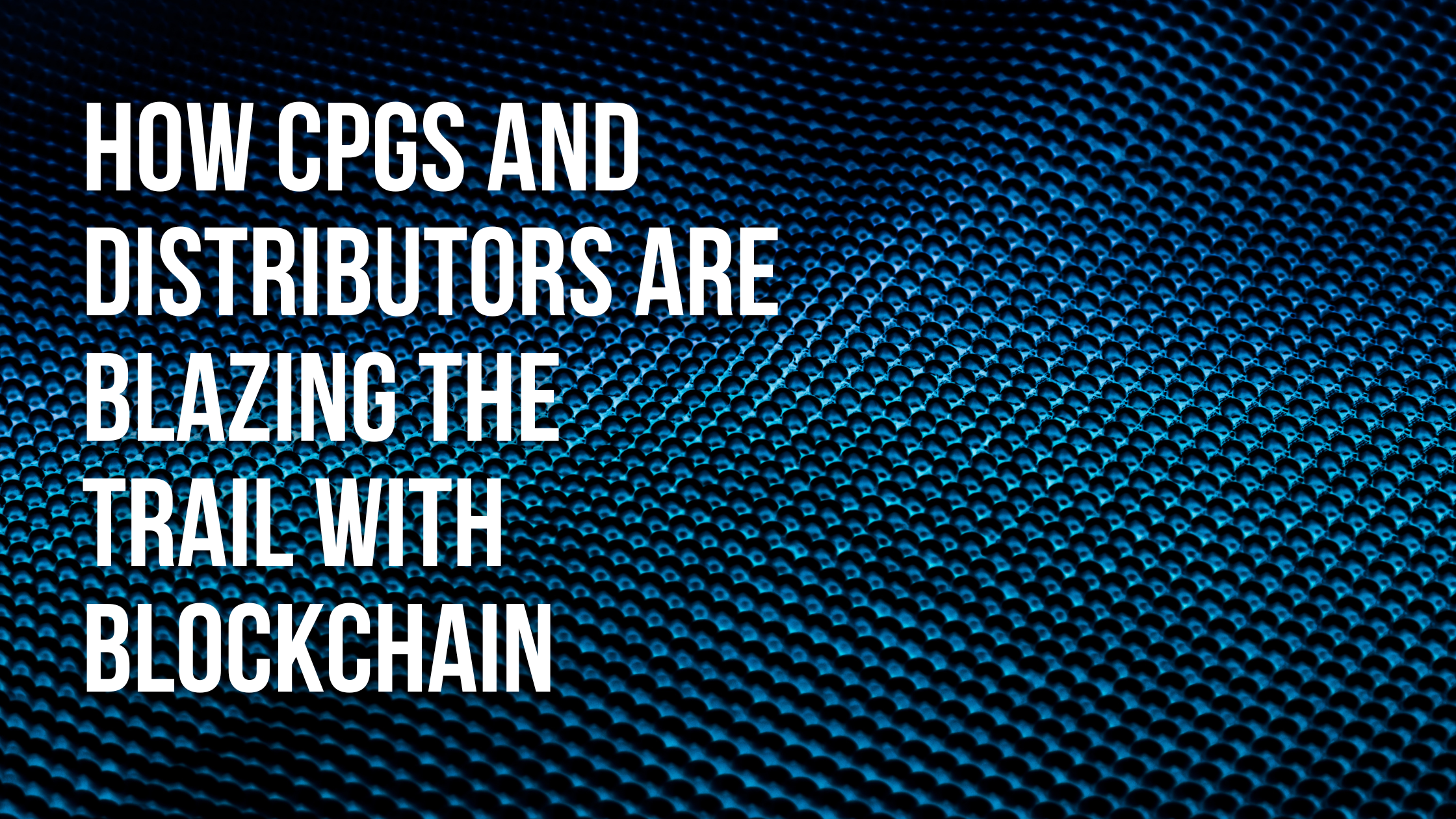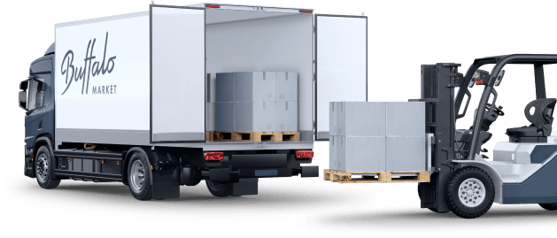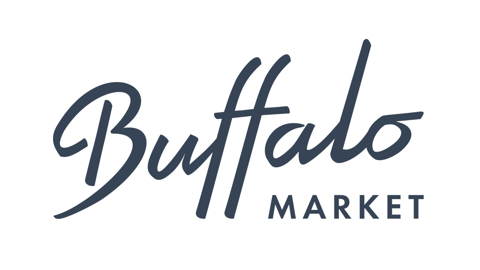How CPGs and Distributors are Blazing the Trail with Blockchain
 To stay ahead of its competitors, a business must be willing to chart cunning new paths to success. One increasingly common way of staying on the cutting edge? Blockchain technology.
To stay ahead of its competitors, a business must be willing to chart cunning new paths to success. One increasingly common way of staying on the cutting edge? Blockchain technology.
While not an entirely new form of tech, novel ways of using blockchain to innovate whole industries have emerged. Some industries, like CPG distribution and logistics, stand to benefit immensely from adopting blockchain into their processes.
Here, we'll look at how this tech is being used across CPG and retail and how Buffalo Market leading the way for blockchain in food distribution.
What is blockchain?
Blockchain is a digital ledger. It chronologically stores transactional information, so you can easily see data points along a timeline, each linked to the one that came before it.
Importantly, blockchains are immutable and freely accessible. That means the data stored there can't be altered or falsified and is visible to anybody at any time.
These qualities make it one of the safest and most reliable ways to store transactional data. For that reason, you might hear of blockchain most often used in the context of finance, but, as you’ll see, its usefulness doesn’t end there.
How is blockchain useful for logistics and distribution?
Logistics
Businesses can use blockchain to improve transparency throughout their supply chain. You—and your customers—get a better idea of where your products are coming from, allowing you to leverage this data in various ways.
Additionally, you can use blockchain to start automating and tracking invoices. This improves efficiency, saves money, and boosts productivity.
Distribution
Distributors can use blockchain to verify and automate payments. As soon as products are moved from one location to another, the blockchain can initiate transactions. This removes the need for escrow, speeds up the movement of money, and creates a better experience overall for everyone involved.
Distributors can also use blockchain to ensure that transactions and the movement of goods are legitimate and compliant with local regulations. You can easily audit a blockchain, ensuring all parties follow all necessary rules and regulations.
Lastly, where blockchain can provide transparency in logistics, it can do the same in distribution, giving insights into how and when transactions occur.
 How does blockchain benefit consumers and brands?
How does blockchain benefit consumers and brands?
While the uses for blockchain in CPG are sure to multiply, these are just some examples of how this tech is being used in the industry today.
For consumers
Product tracking
One major benefit of using blockchain for logistics is that it can improve product tracking for consumers. Increasingly, consumers are becoming more interested in the origins of the products they purchase.
However, the industry needs to do a better job of keeping up with this demand. Consumer packaged goods companies and retailers struggle to provide transparency, as it is difficult to sort through and deliver this data.
Blockchain technology can make this much more straightforward. Businesses can easily make their blockchain for products available, allowing consumers to see a real-time view of the journey that products have taken. This level of transparency and accountability builds trust between consumers and producers.
Product safety
Another benefit of blockchain for consumers is that manufacturers can use it to improve product safety. As mentioned, consumers can rely on blockchain technology to see where products have originated, any other products they may have come into contact with, the complete list of ingredients, manufacturing processes, and so on.
Businesses can make this data readily available by placing scannable QR codes on packaging. Shoppers can then scan these codes to quickly see any information they're interested in on a particular product.
This would help reduce outbreaks of unsafe food, prevent complications with allergies and health concerns, and so on.
For CPG brands
Brands can use blockchain to enhance efficiency, grow, and stay competitive.
Processing speed
Blockchain removes intermediaries and manual functions for any given exchange. This means transactions can happen faster, within seconds in some cases.
Since information can be processed so quickly on the blockchain, brands can problem-solve faster than ever before. Questions that used to take days to answer can now be resolved almost instantly.
Trust-building
Consumers are increasingly interested in the origin of their purchases. Until recently, answering questions about whether ingredients for a given product were sourced ethically (legally, even) or how far an item had to travel to end up in their shopping cart was nearly impossible.
Commodities change hands so frequently along the supply chain that there was simply no easy way to know where they came from.
Now, if transactions for a specified good take place on the blockchain, that information is not only recorded but available for shoppers to see for themselves at any time. This builds trust between brands and their customers.
Competition
Blockchain is a relatively new tool and is adding new use cases all the time. Those who aren't leveraging new tech to their advantage are already falling behind.
By adopting blockchain now, you can stay competitive in a changing landscape. It can give your business the edge it needs to stay ahead.

How CPGs are using blockchain
There are a number of brands already using blockchain to their advantage. Here’s how some of CPG’s biggest players are putting blockchain into practice.
Nestlé
Nestlé, one of the largest corporations in the world, is using the blockchain to track the movement of its products from New Zealand to the Middle East.
This project allows customers to track where products are and where they've been — instantly. This ensures that products are safe to consume and that Nestle is holding true to its claims.
PepsiCo
The European arm of this beverage giant has partnered with the authentication firm Security Matters to implement a tracking system for waste.
Security Matters uses markers to identify, track, and sort discarded packaging. This project is part of a larger one that PepsiCo helps will improve waste management for its products. The end goal is to implement closed-loop recycling systems and authenticate the company’s sustainability claims.
How retailers are using blockchain
Retailers around the world are also finding ways of folding blockchain into their business model. Here’s how some of the biggest are hoping to change the game:
Walmart
For a company as large as Walmart, providing products that are consistently appealing and safe to consume is a significant concern. A food safety issue for a company of Walmart’s size can become a massive and costly problem that is difficult to contain.
With blockchain, Walmart can better track where its products have been. In a food safety scare, potentially contaminated products can be quickly identified and removed from stores.
Carrefour
Carrefour is a major player in the European retail sector, providing food that needs to meet strict international standards.
Blockchain is, of course, an excellent tool for ensuring that products are held to standard. Carrefour can easily monitor everywhere that a particular product has been, allowing the company to serve its products as advertised with confidence.
Like Walmart, this allows customers to purchase products from Carrefour comfortable in the knowledge of their safety.
How Buffalo Market uses blockchain
Buffalo Market is the first food and beverage distributor to take advantage of this incredible technology.
From asset tracking to environmental monitoring, here’s how we use blockchain to be the country's fastest, most transparent distributor:
Helium-enabled sensors on delivery trucks
One of the key implementations of blockchain technology we’re using at Buffalo Market is the installation of Helium-enabled sensors on our fleet of delivery trucks. Helium is blockchain-based technology that provides internet connectivity to IoT (Internet of Things) devices like sensors and trackers.
These sensors tell us where all of our trucks are at any given moment and upload that information to the Helium blockchain in real time. Customers can easily verify that shipments arrive when and where we say they do.
Additionally, the onboard sensors detect temperature and humidity levels inside the truck. For refrigerated and frozen freight, we can guarantee that items were kept at temperature throughout their journey.
Monitoring air quality
Another use case we've found for blockchain tech is monitoring air quality. Several of our warehouses are located in agricultural regions known for having poor air quality.
AQI sensors placed inside and outside our warehouses help inform the community and environmental scientists of current air conditions.
Modernization of inventory management
Inaccurate inventory counts plague the retail and CPG industries. We’ll soon implement an RFID-based inventory management system that automatically counts the number of units being exchanged and stores that data on the blockchain.
Accurate inventory counts help brands and retailers maximize profits and reduce waste.
Work with a distributor at the forefront
Buffalo Market is the fastest, most efficient, and most transparent food and beverage distributor in the United States.
Our tech-forward business philosophy grants our partners unprecedented access to their data and the ability to manage their distribution at the highest level.
To learn more about how we’re modernizing the industry and can help grow your business, reach out to one of our experts today.





